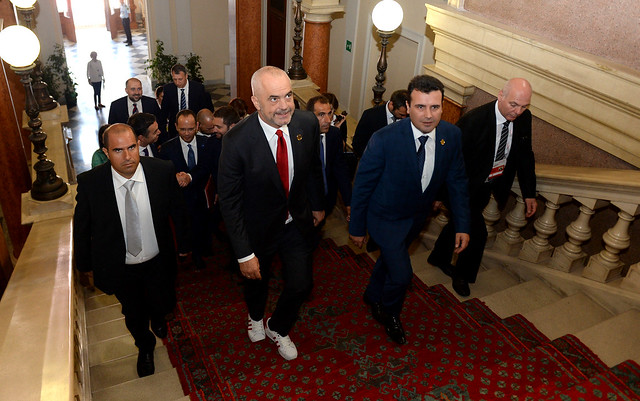German Chancellor Angela Merkel and Croatian Prime Minister Andrej Plenkovic, who on Thursday arrived in Berlin for a two-day visit, expressed hope that the EU-Western Balkan summit meeting in Zagreb would bring about progress in opening accession talks with Macedonia and Albania.
The two officials discussed the coordination of activities pertaining to the presidency of the Council of the European Union considering the fact that Croatia is the current country-in-chair and Germany will be the next one in the second half of 2020.
Merkel and Plenkovic reiterated their commitment to finding solutions for the issues such as the exit of Great Britain from the European Union, the EU’s Multiannual Financial Framework and a stalemate in the enlargement of the EU bloc.
After the meeting, Merkel said that the EU-Western Balkan summit meeting, set for May in Zagreb, “is a very important thing considering the problems in the opening accession negotiations with Macedonia and Albania.”
According to Merkel, the two candidate countries could go their separate ways once negotiations begin, but that should not be decoupled.
I believe that Albania and Macedonia belong to the same group. We have Serbia and Montenegro, Macedonia and Albania, and finally, we have Bosnia and Herzegovina and Kosovo – where we have a different situation. That is why I believe that if we are fair, both countries should start negotiations, but follow different paths because everyone should be judged on their own successes, Merkel said.
In late 2019, France, Denmark and the Netherlands vetoed the opening of the membership talks with those two candidates.
Plenkovic shared Merkel’s optimism about progress to be made at the Zagreb summit meeting on 5-6 May.
The summit meeting will provide a realistic perspective on the relations between the EU and the countries in the neighbourhood so as to define a pace of the accession of the aspirants, said the Croatian premier.
Plenkovic emphasised the fact that his country and Germany have been fostering excellent relations for thirty years.
“Germany has been the most important partner in the political and economic fields for 30 years,” he added.
In 2019, three million German holiday-makers visited Croatia and made over 21 million overnight stays.
He recalled that last year the two countries signed an action plan for boosting the bilateral relations. As a result, new economic projects are being implemented and one of them refers to the selection of Croatia as this year’s partner country of the Green Week in Berlin, the world’s biggest fair for food, agriculture and horticulture.
The fair is taking place at the Berlin Exhibition Grounds from 17 to 24 January.





Comments are closed for this post.